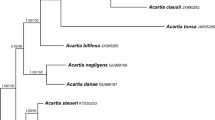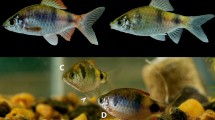Abstract
The facultative parasitic copepod Pseudomyicola spinosus (Raffaele & Monticelli) was cultured and mated under laboratory conditions. Twenty virgin females were cultured in isolation and mated. They were cultured individually after mating, and examined for lifespan, number of ovipositions, number of eggs, and other features. The longest lifespan of a female P. spinosus was 2.3 years (849 d). This female laid eggs 106 times after a single mating, and all of the eggs developed. The lifespan and number of ovipositions varied with the individual, but the interval between ovipositions showed less variation (7.0±2.3 d). The number of eggs laid at one oviposition decreased with the increase in the age of the female. The number of eggs at each oviposition was smaller in laboratory females than in wild females, but the oviposition rhythm and the interval between ovipositions seemed to be the same. The sperms seem to survive for quite a while in the seminal receptacle of a female. A male can copulate a multiple of times. The lifespan of P. spinosus in the natural environment should be less than a year, considering the lifespan of the host mussels.
Similar content being viewed by others
Literature cited
Ho, J.-S.: Origin and dispersal of Mytilus edulis in Japan deduced from its present status of copepod parasitism. Publ. Seto mar. biol. Lab. 25, 293–313 (1980)
Hoshina, t. and Y. Sugiura: On a parasitic copepoda, Pseudomyicola ostreae Yamaguti 1936, obtained from a species of bivalve, Laternula kamakurana. Bull. Jap. Soc. Sci. Fish. 20, 13–15 (1954) (In Japanese with English abstract)
Humes, A. G.: The cyclopoid copepod Pseudomyicola spinosus (Raffaele & Monticelli) from marine pelecypods, chiefly in Bermuda and the West Indies. Beaufortia 14, 203–226 (1968)
Kajihara, T., M. Hayashi and K. Nakamura: Rearing method of a parasitic copepod, Pseudomyicola spinosus (Cyclopoida), in laboratory. Bull. Plankton Soc. Japan 27, 123–124 (1980)
Kajihara, T., Y. Ura and N. Ito: The settlement, growth and mortality of mussel in the intertidal zone of Tokyo Bay. Bull. Jap. Soc. Sci. Fish. 44, 949–953 (1978) (In Japanese with English abstract)
Nair, K. K. C. and K. Anger: Experimental studies on the life cycle of Jassa falcata (Crustacea, Amphipoda). Helgoländer wiss. Meeresunters. 32, 444–452 (1979)
Nakamura, K. and T. Kajihara: Distribution of a cyclopoid copepod, Pseudomyicola ostreae Yamaguti, associated with the marine mussel, Mytilus edulis galloprovincialis Lamarck, in Tokyo Bay, Japan. Proc. Jap. Soc. Syst. Zool. 16, 17–22 (1979)
Nakamura, K., T. Kajihara and M. Oka. Development of a cyclopoid copepod, Pseudomyicola ostreae Yamaguti, associated with a marine mussel, Mytilus edulis galloprovincialis Lamarck: external structure of nauplius in six stages. Proc. Jap. Soc. Syst. Zool. 17, 38–44 (1979)
Yamaguti, S.: Parasitic copepods from mollusks of Japan, I. Jap. J. Zool. 7, 113–127 (1936)
Author information
Authors and Affiliations
Additional information
Communicated by M. Anraku, Hiroshima
Rights and permissions
About this article
Cite this article
Kajihara, T., Nakamura, K. Lifespan and oviposition of the parasitic copepod Pseudomyicola spinosus under rearing conditions. Marine Biology 87, 55–60 (1985). https://doi.org/10.1007/BF00397005
Accepted:
Issue Date:
DOI: https://doi.org/10.1007/BF00397005




